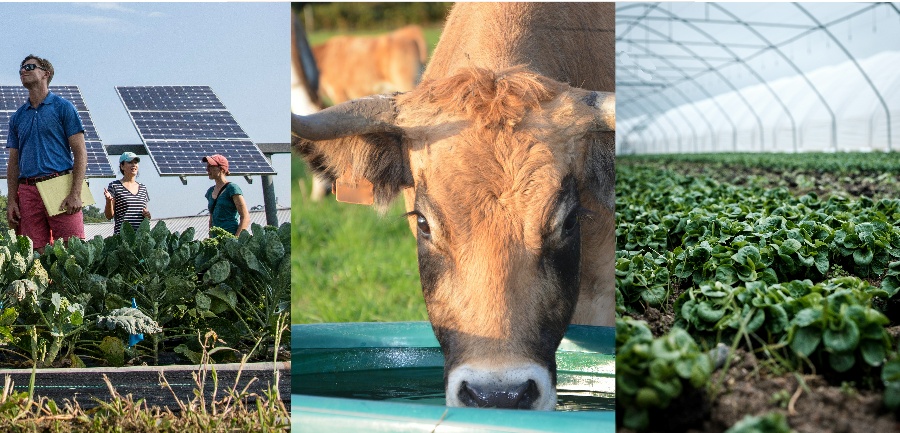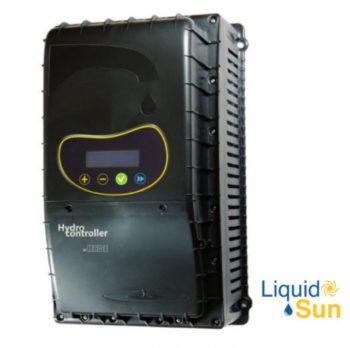As experts in water management and with a growing trend in businesses and individuals wanting to live off grid or get off-grid or to simply make their electricity use more environmentally friendly we are often asked about solar powered water pumps. Specifically “How does a solar water pump work?” and “Can I use a solar water pump for irrigation in the UK?” are two questions that our technical team are asked a lot. It is the beginning of conversation where the answer very much lies in what the solar water pump needs to achieve. It can be a complex conversation. As experts in water management, we have a lot of expertise in off-grid solar pumped water systems. We have put together some answers to our most commonly asked questions about solar water pumps and solar panels to pump water.

Solar Powered Water Pump for irrigation and livestock [image credits from left to right: Science in HD, Jenny Hill and Daniel Fazio].
Can a solar panel power a water pump?
Yes, solar panels can be used to power water pumps even in the UK and other northern latitude locations. There are several possible solar pump systems that you could install. We have listed the main types of solar power water pump installation options below with their main uses and limitations:
- DC extra low voltage variable speed pump. Used in low end consumer pond pumps where a single solar panel is connected directly to the DC motor of the pump, speed varies with voltage put out by the small panel. Mass market products of this type often disappoint in northern latitude such as the UK.
- DC extra low voltage fixed speed pump with storage battery. Usually a self-contained solar pump unit. A solar charging system runs independently of the pump, the pump is engaged automatically when a high voltage threshold in the battery is reached and shuts down again at lower voltage. Pumps used are usually diaphragm type with automatic pressure switch and best used intermittently for filling troughs or for off-grid worksites. Not best suited to high volume use.
- DC low voltage well pump. These are proprietary complete systems in which the pump and controller must be matched and from the same manufacturer, requires several large solar panels and runs the pump at variable speed as and when sunlight is available to generate power. Often expensive, locked in to a single brand/vendor once installed.
- AC voltage fixed speed pump with intermittent operation. Usually single phase 220-240VAC pumps, requires a storage battery and soft start inverter, can operate with as little as 1 solar panel.
- AC voltage variable speed pump. Off-grid solar powered water pump is achieved using Mac3 HydroController Solar combined with a 3 phase 220-240VAC or 380-415VAC pump and several solar panels. This option provides the most usable flow and pressure for commercial and agricultural installations. A storage tank is typically used instead of battery storage alone, the idea being to lift water to a greater height while sunlight power is available, for later gravity distribution.
- Separate grid-tied power system. A standard mains solar power installation with grid-tied inverter supplements mains electricity used for pumping during daylight or makes use of feed in tariffs to offset the cost of pumping.
Why use solar power for a pump?
- To reduce metered electricity usage
- To operate where mains electricity cannot reasonably be provided (economic or technical limitations) and other forms of remote power generation may not be practicable or desirable (noise, pollution risk etc).
- To avoid practical power distribution issues, groundworks and associated disruption and cost.
- To reduce environmental impact, lower carbon footprint.
How far or how high can I pump water using solar power?
With low voltage diaphragm pumps the flow rate and pressure are typically limited to around 20 litres per minute (lpm) or a maximum head of around 150m. Low voltage or DC centrifugal pumps have higher flow rates but options are limited. For AC pumps connected to HydroController Solar there is no specific limitation. Whatever can be delivered using electrical mains powered inline, well or borehole pumps can be achieved using an adequately sized solar power system, even over several kilometres or hundreds of metres elevation.
What is battery storage for solar?
Systems with storage batteries can allow for demand operated systems (taps and troughs) to be run at night or in poor weather using solar energy stored during the day. The use of battery storage does require some extra components such as a charge controller. There is a gradual reduction in battery capacity over time and in colder weather. Ultimately batteries have a limited lifespan and there will be an ongoing maintenance cost in replacements. Charging and discharging will also incur an energy loss.
Systems without a battery run the pump at variable speed as sunlight changes. They suffer less losses associated with charging and discharging of batteries, turning all voltage directly into usable energy. Such systems will move more water for a given size of pump and require less maintenance, but work best when used with a storage tank situated at a high point which can be gravity fed to points of use at lower levels. Over-sizing the storage tank beyond daily needs allows a surplus of water to be built up during the summer. A gain in available power can be achieved by over-sizing the solar array and by over-sizing the pump pressure to benefit from operation at reduced speeds,. A balance must be made between the size of components, tank storage capacity and expected insolation during daylight hours over the year. 3P Technik UK is experienced in sizing such systems for typical UK weather patterns.
Control of pumping according to the water level in the source (pond, river, borehole, well etc) or storage tank can be provided by float or pressure switches. For long distances a radio link or GSM (cellphone) link is often used.
It may still be necessary to provide for backup power during winter months (such as a diesel generator) depending on how critical the supply of water is, but correct sizing of system components will minimise the required runtime of backup power systems.
During freezing weather the system may need to be shut down and the pipework drained to avoid damage unless protected from frost.
How do I convert my fountain to solar power?
For larger fountains and water features a 3 phase fountain pump is connected directly to the Mac3 HydroController Solar. The power output of the HydroController and connected solar panels must match or exceed the power requirement of the pump. The performance of the fountain will follow the amount of sunlight available and will usually peak during hot weather in July.
Can I run my pool pump on solar power?
Yes, also using Mac3 HydroController Solar, although turnover of water may be insufficient using solar energy in winter months unless a mains powered changeover option is provided. Of course, this may be ideal for seasonally used pools.
How many solar panels does a pump need?
This is an area where technical expertise can be invaluable to avoid abortive expenditure. There are some useful considerations to bear in mind. The minimum requirement is for the power output of the panels to exceed the required power of the inverter and pump. To do this we must take account of the VA requirement (apparent power) of the system not just kW. Applying a power factor of 0.9 a 2kw 400VAC pump would draw 2.22kVA and the inverter may experience a power conversion loss of 5-10%. So 2440w would equal 3 x 960w panels.
However, a DC to AC inverter requires a minimum input voltage (HydroController Solar needs 300 to 750VDC) and so the actual minimum for 50v panels would be 6 with at least 406w each. This voltage would need to be achieved during expected sunlight not just at the maximum (rare in the UK) and so in practice, solar panels in the UK must be oversized by a factor known to deliver adequate performance in accordance with the client’s requirements.
The HydroController Solar does not need to be matched to any particular brand of pump or panels, allowing for easier maintenance than other types of system, and without the need to service and maintain a battery (solar batteries usually consist of several large cells or batteries and can amount to a considerable expense). The only connections required are 1 DC input from the panels, one AC output to the pump and optionally a pressure sensor and/or level sensor.
Can I use a solar water pump for irrigation in the UK
 Solar pumping for commercial applications such as garden centre or horticultural irrigation, livestock drinking water supply etc requires careful design and many installers have found off-the-shelf systems to fall short of customer expectations.
Solar pumping for commercial applications such as garden centre or horticultural irrigation, livestock drinking water supply etc requires careful design and many installers have found off-the-shelf systems to fall short of customer expectations.
3P Technik have developed considerable knowledge in this field and have successfully deployed HydroController Solar on many challenging sites bringing abundant water to remote hilltops where others had already declared it impossible. We can offer a design advisory service at very low cost to guide you through the process of developing a bespoke and so effective solution.
In designing a solar powered water pump system we need to know the general solar pump installation goal, ie a solar water pump for livestock drinking water, yard washdown, agriculture or solar water pump for irrigation etc?
Then we will also need to understand specifics like:
- what volume of water it the solar powered water pump needs to pump, (ie how much water to you need and how often).
- what distance the pump needs to pump the water (and height difference).
- whether the water is needed “on demand“ (when you turn the tap) or just when the sun shines
- whether you need a back up system in case of no solar power (cloudy days) or prolonged drought (water source running dry).
To discuss your large scale or commercial Solar Powered Water Pump requirements, please email and overview of your needs in the first instance to sales@3ptechnik.co.uk or call us during office hours on 01239 623506.
